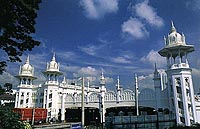Interviews with modern Malaysians introduces us to the shadows and reliefs of gay life in that culture. Not great but not bad, for now.
Also see:
Islam and Homosexuality
Gay Malaysia News & Reports 1999 to present
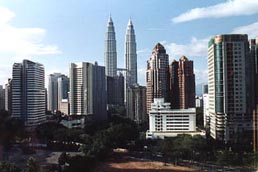 Gay Muslim Reports
Gay Muslim Reports
By Richard Ammon
Updated April 2011
The Accidental Informant
In the shadows of the soaring stainless steel and glass of the Petronas Towers I ate lunch at a an outdoor café overlooking the pond, park and water fountain. My waiter made several trips to my table to take the order, deliver the food and re-fill the water, as was his duty. Each time he came over he seemed to sashay a bit more so I finally asked him the unnecessary question: was he one of us? “Most definitely I am,” he replied with a happy smile and dark focused eyes, in perfect English.
So what’s it like here, being gay?” I replied, a bit surprised at his openness, Without dropping a beat, he said, “Well, you know, it’s a bit harsh. The religion here makes it hard to feel completely good.”
But if you are not religious, then it’s better?
“Yes, definitely. I think no religion makes us feel good and that I think is a sin,” he replied. The outdoor cafe was not too busy and he seemed willing to engage with me. His name was Walid and he had worked here for about two years. “But I am not religious. How can I be, I don’t want to feel bad.’
Is it a problem here in Malaysia to be gay? Can you be fired from your job if they know?
Walid laughed, “I don’t have to worry. My boss is a lesbian! She knows about me and I know about her so we get along fine.”
Where do lesbians in KL go to meet and socialize? There are four gay bars and two saunas but where are the lesbian bars?
“They might go to a gay bar, but not much. They are very quiet. They have their friends and see each other outside–you know, like for shopping or for lunch.”
Does your family know about you?
“Oh yes. My mother used to say I acted like a little girl so she was not surprised.”
Is Malaysia hard for gay people? Do you have discrimination and homophobia?
“Yes, of course, like everywhere. Last week, my friend was facilitating an AIDS conference at a local university and the film, ‘Philadelphia’ was shown. He said several students objected to the film being screened and to gay issues being raised at the conference.” He said that most people mind their own business as a way of being tolerant. Malaysia is a country full of different languages, customs, races and religions. Everybody is different–Indonesian, Thai, Chinese, western; Muslim, Buddhist, Hindu, Christian.
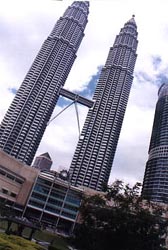 Walid went on, “No one is so big they can take over. Bad discrimination and anti-gay violence is not so serious here as compared to say, in the US.”
Walid went on, “No one is so big they can take over. Bad discrimination and anti-gay violence is not so serious here as compared to say, in the US.”
Maybe this is because gays are not so out here, I said. Does the Prime Minister Mahathir try to be fair? A couple of years ago he said nasty things about gays in public.
“I don’t think so. I think he is a tolerant man.”
Except when it comes to Anwar? Why did Mahathir use homosexuality against Anwar? The western media think Mahathir is very homophobic.
“I don’t think so. You know, Anwar is gay, or bisexual because he has a wife and children. Mahathir used that to humiliate Anwar, to make his respect bad, to bring him down so people would not feel sorry for him. The big problem was Anwar’s bad policy decisions without asking Dr.Mahathir, so he had to remove him. It was a political situation but Mahathir used the sex scandal to ruin Anwar’s character.”
In the west there is an impression that Mahathir is very homophobic because of the trial and using homosexuality as a scandalous weapon against Anwar. Even the witnesses against Anwar later said they did not tell the truth.
“Yes, that was messy but still Anwar cannot deny he has done some gay things. I think Mahathir is not really as hating against gays; he just used that to remove Anwar. Now that it’s all over, we don’t hear him saying those things against us.
Do you have a boyfriend?
“Yes, two of them!” he said with an impish and slightly embarrassed yet pleased laugh. “One is from here and the other is from Singapore.”
Do they know about each other?
“Oh, no! That would not be good,” he declared with a gasp.
Why do you have two boyfriends?
“I guess because I am very sexed. Maybe I don’t like commitment to one person. That is the way I am.”
Do you live alone?
“No, I live with my local boyfriend.”
So gay life here for you is not so bad?
“Yes. It’s OK. I always want more money but I have work and friends and family. That’s a good life for now.”
And so our lunchtime conversation came and went, squeezed in between salad, entree, dessert and paying the bill. As I left, Wahid waved good-bye with the same cheerful demeanor and a not-indiscreetly blown kiss. It’s no wonder he has two boyfriends.
Dinner Talk–Middle Class, Middle Age
This unexpected chat was the first of several I had with gay guys in Kuala Lumpur. By the end of my visit, my poorly informed perspective about gay life in Malaysia had shifted to a more realistic view. The most notorious notion I (and many western gay observers) had was of a fulminating homophobic dictatorial Prime Minister Mahathir running rough-shod over the field of human rights, as evidenced by his inclusion of homosexuality and “non-Asian values’ as part cause of Malaysia’s troubles in the late nineties.
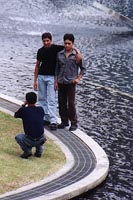 His temper rose during the Asian currency crisis, Mahathir was understandably angry that Malaysia’s hard-won prosperity and stability were undermined by foreign interference–the crash of the Thai currency and the subsequent domino-effect loss of confidence and investment in southeast Asia. Malaysia, under Mahathir’s progressive 18 year leadership was suddenly floundering and the PM’s dream of KL becoming the financial, technological and architectural wonder of Asia was rudely disrupted.
His temper rose during the Asian currency crisis, Mahathir was understandably angry that Malaysia’s hard-won prosperity and stability were undermined by foreign interference–the crash of the Thai currency and the subsequent domino-effect loss of confidence and investment in southeast Asia. Malaysia, under Mahathir’s progressive 18 year leadership was suddenly floundering and the PM’s dream of KL becoming the financial, technological and architectural wonder of Asia was rudely disrupted.
As a result, he lashed out against perceived ‘’enemies’ both at home and abroad. Anwar, the Deputy PM was the most visible and dramatic ‘victim’ of Mahathir’s wrath, accusing Anwar of mismanagement and policy errors. And by adding such a highly taboo accusation as homosexuality to the political corruption charges against Anwar, Mahathir intended to be sure that not only Anwar’s high position was destroyed but also that his personal reputation was degraded.
In the process, Mahathir inadvertently blew open the closet door of ‘unmentionable’ homosexual behavior in conservative Malaysia. From shocked grandmothers to naïve pubescent children, all were served up daily doses of descriptive sexual testimony on the front pages of the newspapers as well as television coverage of the judicial proceedings (some say corrupt) and counter-charges from Anwar and his supporters.
“Yes, it was a bizarre show; every day we could read about homosexuality in the newspapers. It was shocking because people don’t talk about sex in public here–especially homosexuality. That’s never mentioned, and here it was on the front pages.” These observations came from Peng Hew and his friend-from-childhood Joo-Khong as we sat in a sidewalk café one evening across the street from the Regent Hotel.
I met these men about 2 AM the night before as they took a breather from the noise and smoke inside the Blue Boy bar/disco. I had gone to see what this popular place looked and sounded like, as if I didn’t know already. (If there’s one thing that seems to be universal, it’s the ‘gay bar’ look: dark walls and ceiling, mirrored barback lined with liquor bottles, the smell of beer, the thunderous and deafening sound system, flashing lights bouncing shards of color off the mirrored dance ball, the DJ hovering over his mixer to keep the dozens or hundreds of dancing boys hopping on the floor, some shirtless, all sweaty and not a few riding high on some stimulant.)
As I left Blue Boy in the early hours, Peng and Joo standing outside enjoying the cool night air (it was over 90 degrees during the day) I approached them with some small talk and after a while I asked for an interview the next day. At first, understandably, they were apprehensive about a stranger in the night, but after a few minutes they seemed assured enough to agree to dinner the next evening.
Both men are from Chinese-Malaysian families (which are racially distinct from all-Malay families or from Indonesian-Malay families). I wondered if these different cultures had different reactions to homosexuality. Not surprisingly, gays of Chinese-Malaysian descent feel more ill at ease in coming out to their families than full-blooded gay Malaysians. (Another friend has observed that a majority of Chinese in Malaysia speak dialect Chinese and only the upper-class Chinese speak English. One of the long term trends in Malaysia is the gradual loss of English proficiency from a generation ago.)
“It’s this (Chinese) Confucian influence, I think, you know it stresses obedience to authority, loyalty to the family, respecting tradition and laws. Not trying to be different is important, so if I tell my mother I’m gay, that is really rocking the boat. They don’t understand at all how a man wants sex or love with another man. So I don’t say anything,” explained Joo.
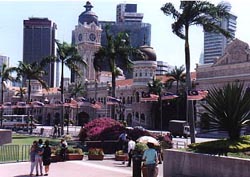 Both he and Peng are businessmen. Joo is a construction project manager with a large company that builds infrastructures such as roads and bridges. Peng is a advertising designer for a small firm. Neither is out to his family or to co-workers. Despite the generally high awareness of homosexuality in KL (as Kuala Lumpur is known) both feel very uncomfortable with others knowing about them, other than close gay friends.
Both he and Peng are businessmen. Joo is a construction project manager with a large company that builds infrastructures such as roads and bridges. Peng is a advertising designer for a small firm. Neither is out to his family or to co-workers. Despite the generally high awareness of homosexuality in KL (as Kuala Lumpur is known) both feel very uncomfortable with others knowing about them, other than close gay friends.
“People know what it is, but they don’t think it’s normal. They would think there is something wrong with us. Awareness doesn’t mean that acceptance is there,” said Peng. He thought he might be fired if he came out to his boss. “It’s okay to be divorced and single, but not single.”
Both men, in their forties, still hope for long term partners but neither expects it will really happen. Peng lives with his family and a sister. This provides no opportunity for dating or privacy at home, and he doesn’t see how he could leave home without being married. “I am the good son, so I take care of my parents, ” he said with a calm resolve that seemed surprisingly devoid of regret. Joo recently bought a two-bedroom condo in one of the countless high-rise projects that have sprouted up in KL over the past ten years. He doesn’t worry about his family because they live far away.
As for long term relationships, Joo and Peng knew of only one couple, who had been together for eight years. “There is such a mix of cultures and language here. It’s difficult to have a Malay boyfriend because they have a different language and culture. Malaysia seems like it’s one country, but there are many separate parts. Most Chinese-Malaysians speak English and most Malays speak ‘Bahasa Melayu’ the national language.”
Then there is the religious influence. About half the country are Muslim where homosexuality is never considered valid. “Muslim guys,” said Peng, “feel that a long-term relationship is an affront to Alla;, they have their own homophobia inside with any guy they meet.” Joo further noted that there are no gay therapists for singles or couples if they need support or help.
As for lesbians, both Joo and Peng said they were hard to find and their lives were kept very discreet.
There are currently four gay bars and two saunas in KL. There have been few police raids or harassment in recent years. Malaysia has a religious police force, like Saudi Arabia which are a nuisance. (See report #7 in Malaysia News )They raid bars, saunas and clubs even if the secular police wish to turn a blind eye. One of the gay saunas, Babylon KL, was raided by these vigilantes and later closed down. Joo adde. “as long as you don’t make yourself public, they leave you alone. Mahathir doesn’t really want to focus on us. Much more important to him is pushing ahead with his vision of making Malaysia the next Silicon Valley of Asia. He has always felt his rival Singapore could be surpassed by KL because of the base of labor and resources here.”
As for the future here of gay life? Joo thought there would be some more bars and saunas, but definitely no parades or festival for a long time to come.
Café Talk-the Young Ones
The next day, I had an unexpected exchange with two younger Malaysian gays. We spotted each other as I walked past another Starbucks café–which have arrived in swarms in Asia in the past three years. This one was just up the street from where I had diner with Peng and Joo.
Salam and Fain apeared about fifteen years younger than Joo and Peng–almost a generation– and it showed in their more cavalier and carefree attitudes about being gay in KL. Both were out to their families; both had have boyfriends for a while although Fain was now single after his British boyfriend dumped him for another young thing. Salam’s current boyfriend had just arrived from Australia and was home sleeping off the late night. Meanwhile Salam was still out –chatting up strangers– after all-night dancing with the enhanced light-and-sound effect that comes from a bit of ‘X’. When we met they were coming down with frappacino; they playfully whistled for me to come sit with them.
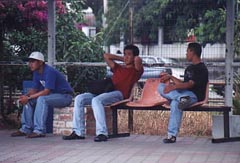 After few comments about their being up all night, I asked what gay was like here. “We have no problem being gay here,” said Fain with a dismissive wave of his delicate hand. “As long as you don’t try to make a scene like balloons and naked asses they leave you alone. I have never seen police stopping gay people in a bar, but I know the Blue Boy disco was raided sometimes–for drugs I think, not for being gay. People were stopped and urine-tested for drugs. The newspapers reported these raids in the late 1980’s and 1990’s.
After few comments about their being up all night, I asked what gay was like here. “We have no problem being gay here,” said Fain with a dismissive wave of his delicate hand. “As long as you don’t try to make a scene like balloons and naked asses they leave you alone. I have never seen police stopping gay people in a bar, but I know the Blue Boy disco was raided sometimes–for drugs I think, not for being gay. People were stopped and urine-tested for drugs. The newspapers reported these raids in the late 1980’s and 1990’s.
Meanwhile, Salam, appeared more restless, blowing occasional kisses and suggesting that we go practice something with fewer words. Tempting as he was, guys usually don’t discuss personal or social issues when they’re being frisky, so I kept picking their, by now, somewhat lucid brains for more information about gay life in Kuala Lumpur. Salam pretended to be crestfallen.
They were not bothered by the small choice of gay bars and saunas; in a city of 1.5 million there were only four bars (Blue Boy, Liquid, Velvet, and Xu) and three saunas (Otot-Otot, Hot Top and Mirage). But in the past few years, as luxury hotels have sprouted up around the Bukit Bintang area in central KL, smaller ancillary venues have also opened such as Starbucks and Coffee Bean shops, Seven-Elevens, trendy restaurants, cafes, clothing stores and sparkling shopping malls with dozens of smaller brightly lit boutiques and stalls. Mobile phones are the very hot item now.
Part of Jalan Bukit Bintang street is blocked off on weekends and the area becomes one of KL’s most trendy pedestrian promenades, the place to see and to be seen, filled with outdoor music and colorful displays of the latest merchandise and fashions from Gucci and food from chic cafes to MacDonalds. Of course, gay folks are never far behind–and often ahead–of such appealing locales and the business of people-watching; cruising is always free and happens with little effort. While the streets roll up about midnight, on weekends, the bars go on for at least a couple more hours, after which the all-nighters move on to places such as Back Room, a mixed club.
Hopeful Shadows
For the gay folks of modern Kuala Lumpur, a quiet emerging hope never goes to sleep, even though that hope is hushed by harsh penal codes: Islamic shariah laws (which applies only to Muslims) forbid sodomy. Malaysia’s secular laws, largely based on the British canon, contain a section that criminalizes “the insertion of a penis into the mouth or anus of another person.” This section applies to both heterosexuals and homosexuals but today it is usually used only against those who commit sex acts forcibly.
There is no apparent effort to disturb the acceptable envelope of calm that has settled on KL’s lesbigay community. Unlike their neighbors to the south in Singapore, KL’s community lacks, perhaps wisely, spirited gadflies willing to push to the edge of political tolerance against a willful government. The result, in Singapore, of this cat and mouse game over the past 4 years has been to clarify what the real (vs. feared) limits are. This strengthening of resolve to play up to but not over those limits has resulted in an energized and active gay business and social community there–but not politically. Although there are still no officially recognized gay-identified organizations there are cleverly prospering commercial ventures that are out and proudly gay in all but name.
This is not to suggest that Malaysian gays and lesbians have been dormant. The local Kuala Lumpur theatre scene–particularly those in the English and Chinese theatre scene–have pushed the social/political boundaries in their own modest ways in the past few years by staging a number of LGBT-themed plays such as “As Is”, “The Killing of Sister George”, “Gross Indecency”, “The Baltimore Waltz” (which is currently running in KL—-March 2002). The highly feminist New York hit “The Vagina Monologues”, with feminist/lesbian characters, was recently staged in KL in conjunction with International Women’s Day. (See Marina Mahathir’s–the Prime Minister’s daughter–commentary in the Gay Malaysia News & Reports link.
For gays in both KL and Singapore, both vying for commercial leadership in southeast Asia, an important difference is the influence of religion. Malaysia and Singapore have been democracies since independence in the 1950’s (Malaysia gained its independence in 1957) and both have been subject to long serving leaders (considered ‘benevolent dictators’ by some) who have essentially pushed their countries toward capitalistic progress and prosperity. As well, both governments have been essentially secular and independent of religious affiliation.
But Malaysia is nearly 60-65% Muslim (by law, a child is Muslim if born to Muslim parents) and there often had been references from within and without the country, that Malaysia was becoming an ‘Islamic state’. So it came as no surprise that last year Dr Mahathir announced officially that Malaysia is no longer a secular state: it is an Islamic state.
Thus, Islam has a privileged position even though other religions may be practiced. Certainly Malaysia is not the kind of bigoted, fundamentalist polity one associates with the term “Islamic state”, but Malaysia does not pretend to be secular. For example, fasting is enforced by state powers given to the religious police, and it is a criminal offense for a Muslim to convert to another religion (and an offense for anyone to try to persuade him to). That being the case, no gay Muslim can formally escape Shariah injunctions against homosexuality. The only question is whether it is enforced or not.
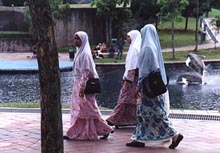 Such religious beliefs have both overt and subtle long-term effects on the character and attitudes of governing minds. Singapore is clearly more secular and liberal; its religion is commerce and free enterprise with this-world priorities (higher education, civil order, a strict but democratic juris system, etc.). And, importantly, there is a highly valued division between self and state, between one’s right to privacy and legal recourse against the power of the authorities.
Such religious beliefs have both overt and subtle long-term effects on the character and attitudes of governing minds. Singapore is clearly more secular and liberal; its religion is commerce and free enterprise with this-world priorities (higher education, civil order, a strict but democratic juris system, etc.). And, importantly, there is a highly valued division between self and state, between one’s right to privacy and legal recourse against the power of the authorities.
Malaysia on the other hand has not escaped the clutch of Islam and its more fundamental conservatism. Religious dogma, with its moral authority, has a unique privilege of intruding into one’s private life; there is no legalistic limit on its presence and often is not constrained by secular laws. “Allah is everywhere-in the mosque, in your living room and in your bed. Even in the dark room you feel this whether you are religious or not,” claimed Peng. “Many young people are not religious Muslims, but we are still Muslims and being gay is still felt to be disobedience to Koranic laws.”
That ominous curse on their sexual urges and romantic desires always shadows a gay person’s thoughts. Even if a person had the courage to be an activist and confront law makers, he would be shamed as an advocate of ‘impure’ ways. There is no secular way to win against sacred authority that claims divinity as the arbiter of human affairs. Better to refrain from public demonstration and keep one’s passion and behavior out of sight.
So, over the past fifteen centuries, since Mohammed codified the laws of Allah, Muslims-gay and straight–have devised various and clever strategies to divide their deepest desires from public posture. Gays have become aware of the important “strategy for maintaining absolute moral prescriptions in principle by keeping silent about the vagaries of ‘human nature’,” states the sociologist Stephen O. Murray in his volume ‘Islamic Homosexualities’ (see link at left).
Another tempering factor that has kept Malaysia from succumbing to overly-fervent homophobic Islamic influence is the Malay culture itself which has always tended to be indulgent and tolerant of individual differences, as long as they were kept private and did not disrupt the social order. Seen either way—-as strategy or discretion—-prudent silence is a coping mechanism that has been wisely and successfully adopted by gay Muslims.
Such discreet silence is perhaps best demonstrated at the entry to the Hot Top sauna located across from Blue Boy disco (immediately behind the elegant Regent Hotel): there is no name sign at all, only an anonymous dimly-lighted staircase leading up to the first floor. And at Blue Boy, it’s hot-time protected by midnight and darkness, I noticed only a small rainbow sign outside during opening hours. When daylight arrived the entire façade was shuttered and padlocked. Invisible.
HIV and Pink Triangle
In November of 2001, during the Bangkok Gay Festival, an award was made by Utopia (Bangkok’s premier gay information and travel center) to Malaysia’s long-standing HIV organization Pink Triangle. Receiving the award on behalf of Pink Triangle was Khartini Slamah, a tireless organizer and advocate for HIV education. This is the closest official ‘gay’ organization in Malaysia but it is careful not to advertise itself as gay. Instead, it advertises itself as an organization working on HIV and sexuality.
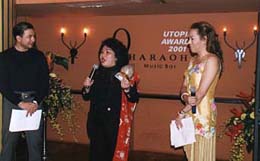 PT was started in 1987 by gay men not as an AIDS organization, as such, but as a group that offered support and counseling to those dealing with issues of being gay. Later it took on HIV work as the epidemic spread and locals became concerned about preventing AIDS among Kuala Lumpur’s high-risk community. Slamah, a trans-gendered soft spoken woman, said that PT received some government funding for education. “Although they don’t like to acknowledge us much, they know we do important work, so they help us.” In the late 1980’s and early 1990’s, PT was in the forefront of grass-root AIDS work in Malaysia and it worked very closely with doctors in the Ministry of Health.
PT was started in 1987 by gay men not as an AIDS organization, as such, but as a group that offered support and counseling to those dealing with issues of being gay. Later it took on HIV work as the epidemic spread and locals became concerned about preventing AIDS among Kuala Lumpur’s high-risk community. Slamah, a trans-gendered soft spoken woman, said that PT received some government funding for education. “Although they don’t like to acknowledge us much, they know we do important work, so they help us.” In the late 1980’s and early 1990’s, PT was in the forefront of grass-root AIDS work in Malaysia and it worked very closely with doctors in the Ministry of Health.
Although the organization is kept busy with presentations at schools, institutions and many work places, much of it’s work has been with marginalized communities such as sex workers, transsexuals, lesbians, drug users and HIV+ people. PT’s work has become more widely appreciated at the highest levels as well. The long serving Prime Minister’s daughter, Marina, is the President of the Malaysian AIDS Council, an umbrella organization of all AIDS-related non-governmental organizations (NGO’s). PT is an important one of the 33 affiliates. PT was instrumental in setting up of the Malaysian AIDS Council and Marina is very aware of the work that PT does.
So Kuala Lumpur’s quiet LGBT community seems to have settled into a separate peace and place of its own. Without drawing attention from official scrutiny it has leveled off to a reasonably quiet lifestyle regulated by self-censorship and a keen awareness that, as a Muslim country, things could be much worse. It’s not great but it’s not bad and no one wants to lose the small comforts that have been gained.
